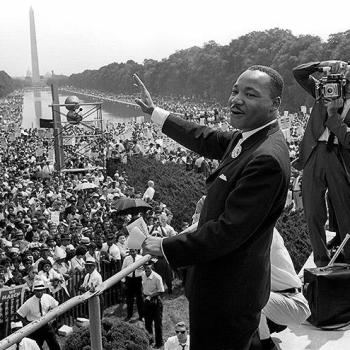 There are good reasons to be concerned about developments in Egypt. As I write this, Hosni Mubarak has just stepped down, reportedly turning power over to the Egyptian army. We can hope that that his departure will discourage more of the violence that has so far claimed over 300 lives. But defending the regime-change process from extremists and factional strife (or an army crackdown) may prove impossible. Egypt has a rocky path ahead.
There are good reasons to be concerned about developments in Egypt. As I write this, Hosni Mubarak has just stepped down, reportedly turning power over to the Egyptian army. We can hope that that his departure will discourage more of the violence that has so far claimed over 300 lives. But defending the regime-change process from extremists and factional strife (or an army crackdown) may prove impossible. Egypt has a rocky path ahead.
As we survey these developments, we seem much surer of our opinions about what our fellow Americans are doing than about anything else. Uncertain though we are on the future of the Egyptian uprising, we are invincibly certain our political opponents are wrong about it.
That said, one reason we have not been able to put a neat label on the uprising is that it represents something unique, something that will eventually disrupt the global status quo. I think that many people feel this instinctively, even if they don't see the events through a specialized ideological prism. What is especially interesting in this case is not our perspective as liberals or conservatives, but our perspective as Christians.
One facet of that perspective is that our brothers and sisters in Christ are on the streets of Cairo, Alexandria, and other Egyptian cities. They have been some of the strongest voices for civil liberties under the repressive Mubarak regime; a number of the bloggers and jailed dissidents from the past two decades have been Coptic Christians. In recent years, the Mubarak government has tolerated and even cooperated with violence against Christians by Islamist extremists in Egypt. It has stood by while extremists have intimidated Christians with threats, physical attacks, demands that Christians renounce their faith, and exclusion from the economy. Women and the young have been particular targets.
In the church bombing on New Year's Day, twenty-one Christians were killed in Alexandria and at least 100 were wounded. In the violence that has erupted alongside the nationwide uprising, a church was bombed in the town of Rafah in the northern Sinai, on Egypt's border with Gaza. And on January 30, Copts were massacred in the rural town of Sharona, west of the central Suez Canal.
But where there is great turmoil, there can be great opportunity. J. Lee Grady, writing at Charisma, quotes an Egyptian Christian friend:
For the church in Egypt, it feels like we are going through a spiritual birth canal . . . I never would have thought two weeks ago that my country would be turned upside down like this. But I am praying, "Lord, use this to establish Your sovereign will."
His friend, "Nadia," cites a scripture passage in which she puts her hopes:
So the LORD will make himself known to the Egyptians, and in that day they will acknowledge the LORD. They will worship with sacrifices and grain offerings; they will make vows to the LORD and keep them. The LORD will strike Egypt with a plague; he will strike them and heal them. They will turn to the LORD, and he will respond to their pleas and heal them (Is. 19:21-22, NIV).
The knowledge that Christian hearts are rising with the prospect of change in Egypt sheds a different light on the events there. Many people around the world have seen the stirring pictures of Egyptian Christians standing guard over their Muslim countrymen while the Muslims were at prayer—and many have heard that Muslims returned the favor, standing guard over a mass celebrated in Tahrir Square for victims of violence. These are not small things in the Middle East. They are especially significant in Egypt, long the seat of Arab intellectualism and doctrinal leadership in Sunni Islam.





